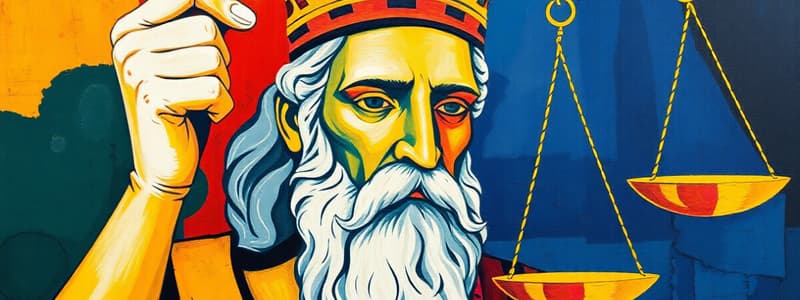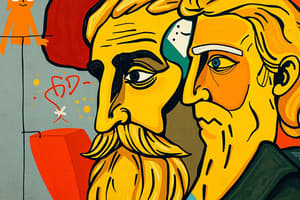Podcast
Questions and Answers
What is the central proposition of Plato's ideal state regarding rulers?
What is the central proposition of Plato's ideal state regarding rulers?
- Philosophers should rule as a right. (correct)
- Democracy is the best form of government.
- Only aristocrats should rule.
- Rulers should always follow public opinion.
What role does education play in Plato's ideal state?
What role does education play in Plato's ideal state?
- Education is solely for individual success.
- Education should be state-controlled to train philosopher kings. (correct)
- Education promotes competition among citizens.
- Education should be privately controlled.
How does Plato suggest individuals should function in his ideal state?
How does Plato suggest individuals should function in his ideal state?
- Everyone should perform multiple roles.
- Functional specialization is irrelevant.
- Each person should perform functions suited to their abilities. (correct)
- Individuals should be trained in every aspect of life.
What is the significance of equal treatment of men and women in Plato's ideal state?
What is the significance of equal treatment of men and women in Plato's ideal state?
What does Plato mean by 'communism of wives and property' for the guardian class?
What does Plato mean by 'communism of wives and property' for the guardian class?
Which of the following best represents the philosopher king as described by Plato?
Which of the following best represents the philosopher king as described by Plato?
In Plato's view, what should education achieve on an individual level?
In Plato's view, what should education achieve on an individual level?
Why does Plato reject the idea of rulers being bound by laws and public opinion?
Why does Plato reject the idea of rulers being bound by laws and public opinion?
What was Aquinas's primary philosophy regarding natural law?
What was Aquinas's primary philosophy regarding natural law?
What was Aquinas's stance on the relationship between church and state?
What was Aquinas's stance on the relationship between church and state?
How did Aquinas approach the welfare of the people in governance?
How did Aquinas approach the welfare of the people in governance?
What is a significant aspect of Aquinas's contribution to political thought?
What is a significant aspect of Aquinas's contribution to political thought?
What did Aquinas believe about monarchy compared to democracy?
What did Aquinas believe about monarchy compared to democracy?
What is a key characteristic of Plato's ideal state?
What is a key characteristic of Plato's ideal state?
What is a notable flaw in Plato's ideal state as described?
What is a notable flaw in Plato's ideal state as described?
How does Plato view the institution of slavery in his philosophy?
How does Plato view the institution of slavery in his philosophy?
What type of government does Plato's ideal state represent?
What type of government does Plato's ideal state represent?
Why is Plato's ideal state considered anti-democratic?
Why is Plato's ideal state considered anti-democratic?
What role does the individual have in Plato's ideal state?
What role does the individual have in Plato's ideal state?
Which statement about Plato's philosopher king is accurate?
Which statement about Plato's philosopher king is accurate?
What is the philosophical implication of Plato's disregard for the working class?
What is the philosophical implication of Plato's disregard for the working class?
What does Plato's theory of Justice imply about functional specialization?
What does Plato's theory of Justice imply about functional specialization?
Which of the following is NOT a feature of Plato's theory of Justice?
Which of the following is NOT a feature of Plato's theory of Justice?
What is a criticism of Plato's concept of Justice?
What is a criticism of Plato's concept of Justice?
According to Plato, who is considered the embodiment of justice?
According to Plato, who is considered the embodiment of justice?
Which of the following statements best characterizes Plato's Ideal State?
Which of the following statements best characterizes Plato's Ideal State?
How does Plato's communism differ from modern communism?
How does Plato's communism differ from modern communism?
What is the premise of the pragmatic theory of justice according to Plato?
What is the premise of the pragmatic theory of justice according to Plato?
What does Plato believe about the relationship between classes in his theory of Justice?
What does Plato believe about the relationship between classes in his theory of Justice?
What is one major cause of revolution according to Aristotle?
What is one major cause of revolution according to Aristotle?
How can the distribution of offices contribute to revolutions?
How can the distribution of offices contribute to revolutions?
Which factor is NOT considered a cause of revolution?
Which factor is NOT considered a cause of revolution?
What method can potentially prevent a revolution?
What method can potentially prevent a revolution?
Which of the following is a consequence of neglecting minor affairs?
Which of the following is a consequence of neglecting minor affairs?
What is a probable result of a defective balance in a constitution?
What is a probable result of a defective balance in a constitution?
What role does political corruption play in a revolution?
What role does political corruption play in a revolution?
Which of the following is NOT a method for preventing revolutions?
Which of the following is NOT a method for preventing revolutions?
Flashcards are hidden until you start studying
Study Notes
Rule of Philosopher King
- Plato's ideal state is governed by a philosopher king, embodying perfect knowledge and reason.
- Such rulers rise above passion, representing virtue and commanding respect.
- They are free from laws and public opinion, prioritizing the welfare of all.
- The central tenet of Plato’s philosophy is that those with knowledge should rule by right.
State-Controlled Education System
- Plato advocated for state control over education to cultivate philosopher kings.
- Education has social and individual functions, promoting societal welfare while aiding personal enlightenment.
Functional Specialization
- In Plato's ideal state, each individual performs functions suited to their abilities and training.
- This specialization prevents inefficiency and promotes societal harmony.
Equal Treatment of Men and Women
- Plato promoted gender equality, insisting both men and women should be developed as valuable citizens.
- He believed in no distinction between genders regarding the development of faculties.
Communism of Wives and Property
- Advocated communism of wives and property among the ruling class to eliminate personal family influences.
- This concept aims to prevent corruption and ensure rulers are dedicated to the state’s needs.
Systematic Reasoning
- Plato’s philosophical system intertwines reason with faith, recognized as a landmark in systematic philosophy.
Natural Law
- Aquinas presented the natural law concept, emphasizing its superiority over human law.
- His ideas influenced later thinkers during the Glorious Revolution, particularly John Locke.
Reconciliation of Church and State
- Aquinas supported church authority while seeking harmony between church and state roles.
- Advocated for moral uplift by the church and political governance by the state to minimize conflict.
Welfare of the People
- Emphasized the duty of rulers to care for the masses, ensuring safety and welfare, particularly for the poor.
Critiques of Plato’s Ideal State
- Ignored the working class, failing to accommodate their interests in an ideal state framework.
- Anti-democratic due to compulsory obedience to philosopher kings, lacking checks on their power.
- Did not condemn slavery; rather, tried to justify its continuation as part of societal structure.
- Totalitarian elements emerge through the absorption of the individual into the state.
Conclusion
- The ideal state governed by a philosopher king is viewed as unrealistic and may overlook individual freedoms and rights.
Causes of Revolution (Aristotelian View)
- Injustice and ill-will among those in power lead to discontent and potential revolt.
- Unequal distribution of political offices can ignite revolutionary sentiments.
- Political corruption and misuse of authority create a fertile ground for rebellion.
- Neglect of minor issues can lead to larger tensions that provoke revolution.
Preventative Measures Against Revolution
- Fair treatment of the poor and avoidance of concentrated power.
- Balance in the constitution prevents dominance by a single group or ideology.
- Intellectual and material development can foster stability within the state.
Studying That Suits You
Use AI to generate personalized quizzes and flashcards to suit your learning preferences.




